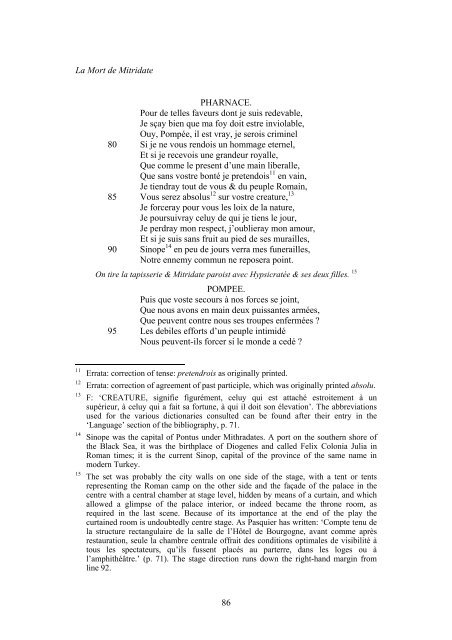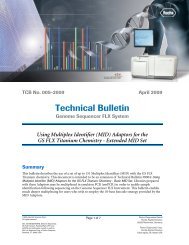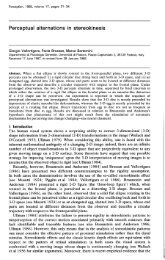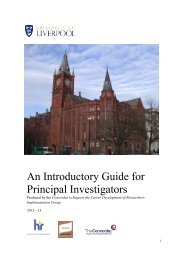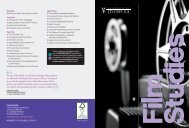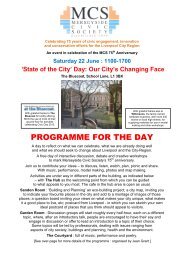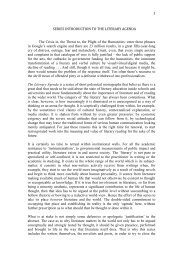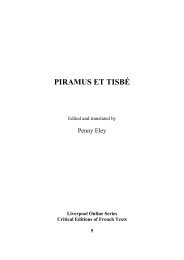LA MORT DE MITRIDATE - University of Liverpool
LA MORT DE MITRIDATE - University of Liverpool
LA MORT DE MITRIDATE - University of Liverpool
Create successful ePaper yourself
Turn your PDF publications into a flip-book with our unique Google optimized e-Paper software.
La Mort de Mitridate<br />
PHARNACE.<br />
Pour de telles faveurs dont je suis redevable,<br />
Je sçay bien que ma foy doit estre inviolable,<br />
Ouy, Pompée, il est vray, je serois criminel<br />
80 Si je ne vous rendois un hommage eternel,<br />
Et si je recevois une grandeur royalle,<br />
Que comme le present d’une main liberalle,<br />
Que sans vostre bonté je pretendois 11 en vain,<br />
Je tiendray tout de vous & du peuple Romain,<br />
85 Vous serez absolus 12 sur vostre creature, 13<br />
Je forceray pour vous les loix de la nature,<br />
Je poursuivray celuy de qui je tiens le jour,<br />
Je perdray mon respect, j’oublieray mon amour,<br />
Et si je suis sans fruit au pied de ses murailles,<br />
90 Sinope 14 en peu de jours verra mes funerailles,<br />
Notre ennemy commun ne reposera point.<br />
On tire la tapisserie & Mitridate paroist avec Hypsicratée & ses deux filles. 15<br />
POMPEE.<br />
Puis que voste secours à nos forces se joint,<br />
Que nous avons en main deux puissantes armées,<br />
Que peuvent contre nous ses troupes enfermées ?<br />
95 Les debiles efforts d’un peuple intimidé<br />
Nous peuvent-ils forcer si le monde a cedé ?<br />
11<br />
12<br />
13<br />
14<br />
15<br />
Errata: correction <strong>of</strong> tense: pretendrois as originally printed.<br />
Errata: correction <strong>of</strong> agreement <strong>of</strong> past participle, which was originally printed absolu.<br />
F: ‘CREATURE, signifie figurément, celuy qui est attaché estroitement à un<br />
supérieur, à celuy qui a fait sa fortune, à qui il doit son élevation’. The abbreviations<br />
used for the various dictionaries consulted can be found after their entry in the<br />
‘Language’ section <strong>of</strong> the bibliography, p. 71.<br />
Sinope was the capital <strong>of</strong> Pontus under Mithradates. A port on the southern shore <strong>of</strong><br />
the Black Sea, it was the birthplace <strong>of</strong> Diogenes and called Felix Colonia Julia in<br />
Roman times; it is the current Sinop, capital <strong>of</strong> the province <strong>of</strong> the same name in<br />
modern Turkey.<br />
The set was probably the city walls on one side <strong>of</strong> the stage, with a tent or tents<br />
representing the Roman camp on the other side and the façade <strong>of</strong> the palace in the<br />
centre with a central chamber at stage level, hidden by means <strong>of</strong> a curtain, and which<br />
allowed a glimpse <strong>of</strong> the palace interior, or indeed became the throne room, as<br />
required in the last scene. Because <strong>of</strong> its importance at the end <strong>of</strong> the play the<br />
curtained room is undoubtedly centre stage. As Pasquier has written: ‘Compte tenu de<br />
la structure rectangulaire de la salle de l’Hôtel de Bourgogne, avant comme après<br />
restauration, seule la chambre centrale <strong>of</strong>frait des conditions optimales de visibilité à<br />
tous les spectateurs, qu’ils fussent placés au parterre, dans les loges ou à<br />
l’amphithéâtre.’ (p. 71). The stage direction runs down the right-hand margin from<br />
line 92.<br />
86


